陕西学位英语语法精讲:非谓语动词
非谓语动词讲解(超全)
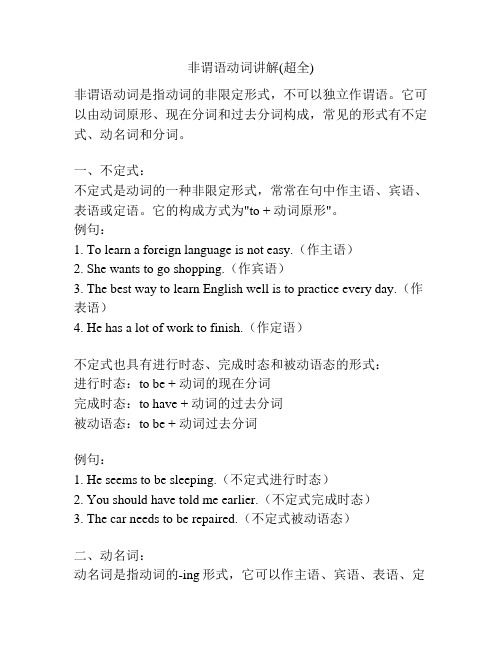
非谓语动词讲解(超全)非谓语动词是指动词的非限定形式,不可以独立作谓语。
它可以由动词原形、现在分词和过去分词构成,常见的形式有不定式、动名词和分词。
一、不定式:不定式是动词的一种非限定形式,常常在句中作主语、宾语、表语或定语。
它的构成方式为"to + 动词原形"。
例句:1. To learn a foreign language is not easy.(作主语)2. She wants to go shopping.(作宾语)3. The best way to learn English well is to practice every day.(作表语)4. He has a lot of work to finish.(作定语)不定式也具有进行时态、完成时态和被动语态的形式:进行时态:to be + 动词的现在分词完成时态:to have + 动词的过去分词被动语态:to be + 动词过去分词例句:1. He seems to be sleeping.(不定式进行时态)2. You should have told me earlier.(不定式完成时态)3. The car needs to be repaired.(不定式被动语态)二、动名词:动名词是指动词的-ing形式,它可以作主语、宾语、表语、定语或状语。
在句中的位置和用法与名词相似。
例句:1. Reading is my favorite hobby.(作主语)2. I enjoy swimming in the summer.(作宾语)3. Her dream is becoming a famous singer.(作表语)4. The girl standing over there is my sister.(作定语)5. He went to the party without saying goodbye.(作状语)动名词与不定式的区别在于动名词具有进行时态和被动语态,而不定式没有。
非谓语动词讲解(超全超实用)
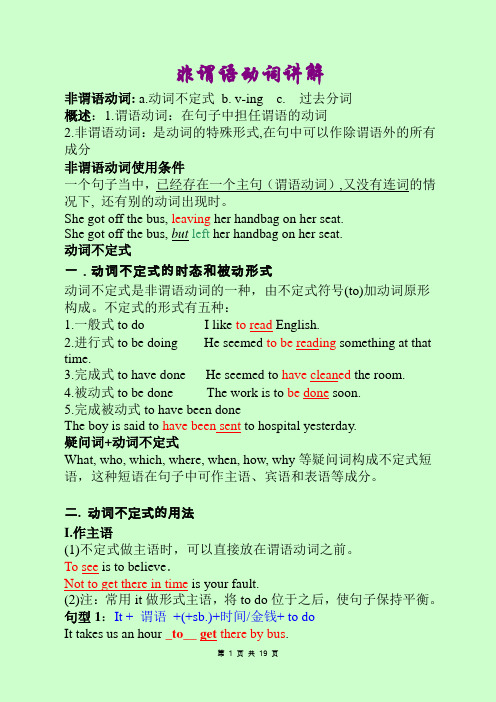
非谓语动词讲解非谓语动词: a.动词不定式 b. v-ing c. 过去分词概述:1.谓语动词:在句子中担任谓语的动词2.非谓语动词:是动词的特殊形式,在句中可以作除谓语外的所有成分非谓语动词使用条件一个句子当中,已经存在一个主句(谓语动词),又没有连词的情况下, 还有别的动词出现时。
She got off the bus, leaving her handbag on her seat.She got off the bus, but left her handbag on her seat.动词不定式一.动词不定式的时态和被动形式动词不定式是非谓语动词的一种,由不定式符号(to)加动词原形构成。
不定式的形式有五种:1.一般式to do I like to read English.2.进行式to be doing He seemed to be reading something at that time.3.完成式to have done He seemed to have cleaned the room.4.被动式to be done The work is to be done soon.5.完成被动式to have been doneThe boy is said to have been sent to hospital yesterday.疑问词+动词不定式What, who, which, where, when, how, why等疑问词构成不定式短语,这种短语在句子中可作主语、宾语和表语等成分。
二. 动词不定式的用法I.作主语(1)不定式做主语时,可以直接放在谓语动词之前。
To see is to believe.Not to get there in time is your fault.(2)注:常用it做形式主语,将to do位于之后,使句子保持平衡。
句型1:It + 谓语+(+sb.)+时间/金钱+ to doIt takes us an hour _to__ get there by bus.It costs you only $ 100 a month to cook at home.It seemed impossible to save money.句型2:I t’s + n. (+ for sb) + to doIt’s our duty _to_ help the poor.It is a great enjoyment _to_ spend our holiday in the countryside..It is a great honor for us to be present at your birthday party.句型3:It is + adj (+ for sb)to do sth(是形容事物的性质的)It is + adj (+ of sb)to do sth(是形容人的品质的)It is easy for me to finish this work before ten.It is very kind of you to give me some help.It's impolite of you to speak to the teacher like that.疑问词+不定式作主语When to start remains undecided.1.It is easy to get there by bus or taxi.2. It takes about 3 hours to see all the birds.3. It is also impolite to speak with your mouth full when you are eating.4. It’s our duty to take good care of the old.5. How long did it take you to finish the work?6. It is stupid of you to write down everything the teacher says.7. When to start has not been decided.8. It seemed selfish of him not to give them anything.9. It’s necessary for you to lock the car when you do not use it.10. It is useful for our health to do morning exercises.II.作宾语接不定式做宾语I want to know this matter.I don’t expect to meet you here(1)常见动词有:like, demand, expect, promise, begin, determine, refuse, fail, manage, learn, seem, forget, want, prepare, pretend, plan, wish等They want to get_( get ) on the bus, didn’t they?He said he wished __to be ( be ) a professor.(2)it作形式宾语I find/feel to work with him interesting .I find/feel it interesting to work with him.Subject+ find/think/feel/make/ consider… it+adj/n + to do sth.1.We thought _it__ better __to_ start early.2.Do you consider _it__ better not _to_ go?3. I feel _it_ my duty _to_ change all that.4.We think it __ important _ to _ obey the law.5.I know _ it _ impossible _ to _ finish so much homework in a day.(3)疑问词+不定式作宾语常常放在这些动词的后面作宾语:tell, advise, show, teach, find out, decide, discuss, learn, explain…He taught us how to use the tool.No one could tell me where to get the book.The dictionary didn’t tell the Frenchman how to pronounce the word.(4) 作介词but, except, besides的宾语。
英语语法非谓语动词讲解超全超实用
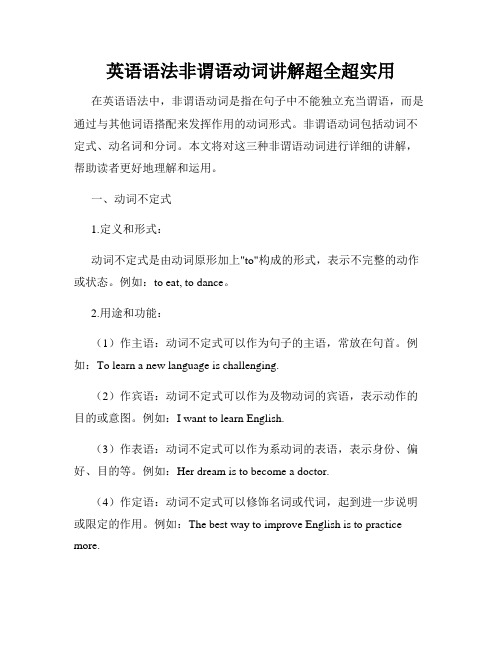
英语语法非谓语动词讲解超全超实用在英语语法中,非谓语动词是指在句子中不能独立充当谓语,而是通过与其他词语搭配来发挥作用的动词形式。
非谓语动词包括动词不定式、动名词和分词。
本文将对这三种非谓语动词进行详细的讲解,帮助读者更好地理解和运用。
一、动词不定式1.定义和形式:动词不定式是由动词原形加上"to"构成的形式,表示不完整的动作或状态。
例如:to eat, to dance。
2.用途和功能:(1)作主语:动词不定式可以作为句子的主语,常放在句首。
例如:To learn a new language is challenging.(2)作宾语:动词不定式可以作为及物动词的宾语,表示动作的目的或意图。
例如:I want to learn English.(3)作表语:动词不定式可以作为系动词的表语,表示身份、偏好、目的等。
例如:Her dream is to become a doctor.(4)作定语:动词不定式可以修饰名词或代词,起到进一步说明或限定的作用。
例如:The best way to improve English is to practice more.(5)作状语:动词不定式可以表示时间、目的、方式等状语的作用。
例如:I went to the park to relax.3.特殊用法:(1)省略to:在某些情况下,不定式的to可以省略,例如在助动词let、make、help等后面。
例如:Let me go.(2)动词不定式的时态:动词不定式没有人称和数的变化,但可以根据不同的时间来使用不同的时态。
例如:I want to go shopping.(现在时态)I wanted to go shopping.(过去时态)二、动名词1.定义和形式:动名词是由动词加上-ing构成的形式,可以作为名词使用。
例如:swimming, running。
2.用途和功能:(1)作主语:动名词可以作为句子的主语,常放在句首。
非谓语动词知识点总结

非谓语动词知识点总结非谓语动词是英语语法中的一个重要知识点,它可以用来修饰主语或宾语,增强句子的表达力和信息量。
在本文中,我将详细介绍非谓语动词的用法和一些常见的形式。
希望通过本文的阅读,读者能够更好地理解和运用非谓语动词,提高自己的英语写作水平。
一、非谓语动词的定义和分类非谓语动词是指在句子中充当动词的成分,但不具备谓语的功能。
它不受主语的人称和数的限制,也不受时态的影响。
根据其形式和功能的不同,非谓语动词可以分为动名词、不定式和分词三种形式。
1. 动名词(Gerund)动名词是动词加上-ing形式构成的名词,常用作主语、宾语、表语、宾补等。
例如:- Smoking is harmful to health.(吸烟对健康有害)- I enjoy swimming in the sea.(我喜欢在海里游泳)- His hobby is playing basketball.(他的爱好是打篮球)2. 不定式(Infinitive)不定式是动词的原形加上to构成的形式,常用作动词、形容词或名词的补语。
例如:- He wants to buy a new car.(他想买一辆新车)- I have a lot of work to do.(我有很多工作要做)- The book is too heavy to carry.(这本书太重,无法携带)3. 分词(Participle)分词是动词的-ing形式(现在分词)或-ed、-en等形式(过去分词)构成的形容词,常用作定语、状语或补语。
例如:- The running water is very clear.(流动的水非常清澈)- The broken vase has been repaired.(打破的花瓶已经修好了)- We were surprised by the exciting news.(令人兴奋的消息让我们感到惊讶)二、非谓语动词的用法非谓语动词在句子中具有独立的语法功能,可以用来修饰名词、代词、动词、形容词和副词等,以及构成复合句的各种从句。
非谓语动词的三种形式解析
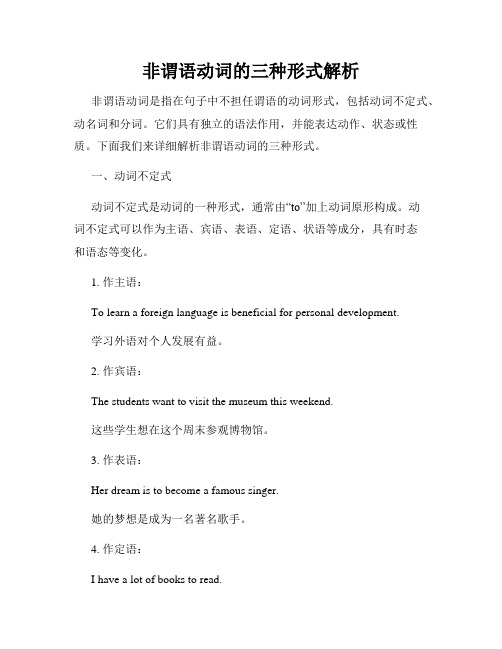
非谓语动词的三种形式解析非谓语动词是指在句子中不担任谓语的动词形式,包括动词不定式、动名词和分词。
它们具有独立的语法作用,并能表达动作、状态或性质。
下面我们来详细解析非谓语动词的三种形式。
一、动词不定式动词不定式是动词的一种形式,通常由“to”加上动词原形构成。
动词不定式可以作为主语、宾语、表语、定语、状语等成分,具有时态和语态等变化。
1. 作主语:To learn a foreign language is beneficial for personal development.学习外语对个人发展有益。
2. 作宾语:The students want to visit the museum this weekend.这些学生想在这个周末参观博物馆。
3. 作表语:Her dream is to become a famous singer.她的梦想是成为一名著名歌手。
4. 作定语:I have a lot of books to read.我有很多书要读。
5. 作状语:He works hard to achieve his goals.他努力工作以实现他的目标。
二、动名词动名词是动词加上-ing构成的名词形式,具有名词的特点,可以担任主语、宾语、定语、表语等成分。
1. 作主语:Swimming is her favorite sport.游泳是她最喜欢的运动。
2. 作宾语:I enjoy playing the piano in my spare time.我喜欢在闲暇时间弹钢琴。
3. 作定语:The running water sounds very soothing.流水的声音听起来很舒缓。
4. 作表语:His hobby is collecting stamps.他的爱好是集邮。
三、分词分词是动词的一种形式,在句中可以作定语、状语等成分,常见的分词形式有现在分词(-ing形式)和过去分词(-ed、-en等形式)。
非谓语动词讲解整理

非谓语动词讲解整理非谓语动词是指能够独立使用,不依赖于主谓结构的动词形式。
常见的非谓语动词包括不定式、动名词和分词。
一、不定式(Infinitive):不定式是动词的一种形式,具体形式为“to + 动词原形”。
在句中常用作动词、形容词和副词的补充性成分。
1. 作主语:To win the championship is our goal.(获得冠军是我们的目标。
)2. 作宾语:I want to visit my grandparents this summer.(我想要这个夏天去看望我的爷爷奶奶。
)3. 作补语:His dream is to become a famous actor.(他的梦想是成为一名著名的演员。
)4. 作定语:I have a lot of books to read.(我有很多书要读。
)5. 作状语:They went to the park to play basketball.(他们去公园打篮球。
)二、动名词(Gerund):动名词是一种名词,具体形式为动词原形加上-ing。
在句中常用作名词的主语、宾语和表语。
1. 作主语:Swimming is one of my favorite hobbies.(游泳是我最喜欢的爱好之一。
)2. 作宾语:She enjoys playing the piano.(她喜欢弹钢琴。
)3. 作表语:His job is teaching English.(他的工作是教英语。
)4. 作定语:I saw a girl carrying a basket of flowers.(我看到了一个拿着一篮花的女孩。
)5. 作状语:He left the house, crying loudly.(他大声哭着离开了房子。
)三、分词(Participle):分词是动词的一种形式,分为现在分词(-ing形式)和过去分词(-ed、-en等形式)。
在句中常用作形容词和分词短语的修饰成分。
非谓语知识点总结
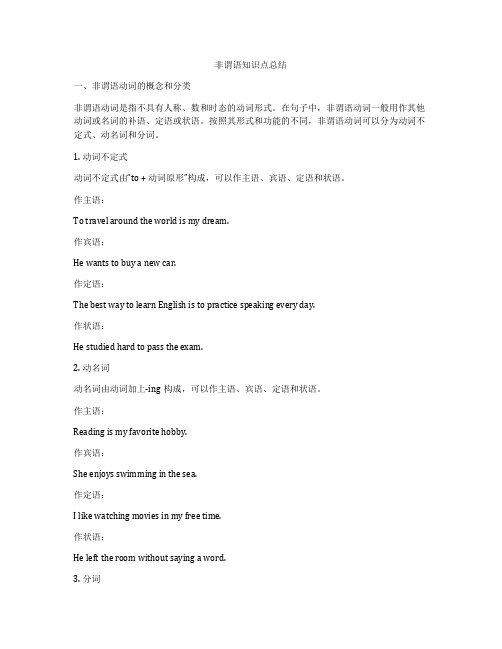
非谓语知识点总结一、非谓语动词的概念和分类非谓语动词是指不具有人称、数和时态的动词形式。
在句子中,非谓语动词一般用作其他动词或名词的补语、定语或状语。
按照其形式和功能的不同,非谓语动词可以分为动词不定式、动名词和分词。
1. 动词不定式动词不定式由“to + 动词原形”构成,可以作主语、宾语、定语和状语。
作主语:To travel around the world is my dream.作宾语:He wants to buy a new car.作定语:The best way to learn English is to practice speaking every day.作状语:He studied hard to pass the exam.2. 动名词动名词由动词加上-ing构成,可以作主语、宾语、定语和状语。
作主语:Reading is my favorite hobby.作宾语:She enjoys swimming in the sea.作定语:I like watching movies in my free time.作状语:He left the room without saying a word.3. 分词分词有现在分词和过去分词两种形式,现在分词一般以-ing结尾,过去分词一般以-ed、en、t结尾,可以作定语、状语和补语。
现在分词作定语:The girl standing by the door is my sister.现在分词作状语:She came home, feeling tired and hungry.过去分词作定语:The film directed by him won the best picture award.过去分词作补语:I was surprised to see the door closed.二、非谓语动词的用法1. 动词不定式(1)作主语To leave now is the best decision.(2)作宾语I want to learn English well.(3)作定语I have a book to read.(4)作状语He works hard to support his family.2. 动名词(1)作主语Swimming is good for health.(2)作宾语I enjoy reading books in my free time.(3)作定语The boy standing there is my brother.(4)作状语He goes to the gym every day, practicing yoga.3. 分词(1)现在分词作定语The girl sitting next to me is my best friend.(2)现在分词作状语Smiling happily, she accepted the gift.(3)过去分词作定语The meal cooked by my mother tastes delicious.(4)过去分词作补语I was excited to hear the news announced by the principal.三、非谓语动词形式的转换1. 从动词不定式到动名词动词不定式to do可以变为动名词doing,例如:I like to swim.(动词不定式)I like swimming.(动名词)2. 从动名词到动词不定式动名词doing可以变为动词不定式to do,例如:We enjoyed singing together.(动名词)We enjoyed to sing together.(动词不定式)3. 从动词不定式到分词动词不定式to do可以变为现在分词doing和过去分词done,例如:He is busy with his work.(动词不定式)He is busy doing his work.(现在分词)He is busy done his work.(过去分词)四、非谓语动词的特殊用法1. 不定式的被动语态动词不定式的被动语态结构为“to be + 过去分词”,例如:He is said to be a good student.2. 动名词的所有格形式动名词的所有格形式是在动名词后面直接加上“的”,例如:I remember his coming to see me.3. 分词作状语表示时间、原因、条件和方式现在分词和过去分词作状语表示时间、原因、条件和方式,例如:Being an experienced teacher, she knows how to deal with children. Having finished her homework, she went to bed.4. 动词不定式作目的状语动词不定式作目的状语表示目的或结果,通常放在句子后面,例如:He ran fast to catch the bus.五、非谓语动词的练习1. 单项选择题(1)We should encourage the students ____ more exercise every day.A. doB. to doC. doingD. are doing(2)I enjoy _____ in the garden in my free time.A. to workB. workingC. worksD. worked(3)The news _____ by the teacher surprised everyone.A. announceB. announcingC. announcedD. to announce2. 填空练习(1)_____ up early in the morning, she went for a run.(2)He wants _____ to the school team next year.(3)She likes _____ to music in her room.3. 句子翻译(1)他想去看电影。
(完整word版)非谓语动词讲解

非谓语动词【知识要点】定义:在英语中,不作句子谓语,而具有除谓语外其他语法功能的动词,叫做非谓语动词。
分类:非谓语动词有动词不定式(the Infinitive);动名词(the Gerund);现在分词(the Present Participle);过去分词(the Past Participle)。
无论它们在句中作什么成分,他们都保持着自己本身的属性特点。
动词不定式:表将来、具体某一次,常在句中可以作: 主语,宾语,定语,状语,补语,表语;动名词:具有名词功能,常在句中可以作:主语,宾语,表语;作定语时表功能;现在分词:表主动和正在进行, 常在句中可以作: 定语,状语,表语,宾补;过去分词:表被动和已完成,常在句中可以作: 定语,状语,补语。
一、动词不定式不定式由“to+动词原形”构成,其否定形式是“not to+动词原形”。
不定式可以带宾语或状语构成不定式短语,没有人称和数的变化,但有时态和语态的变化。
不定式可作主语、宾语、状语、表语、定语和补语,但不能单独作谓语。
2. 不定式的句法功能1)作主语:To finish the work in ten minutes is very hard.在十分钟内完成这项工作很难。
动词不定式短语作主语时,常用it作形式主语,例如上面一句可用如下形式:It is very hard to finish the work in ten minutes.2)作表语:Her job is to clean the hall.她的工作就是打扫大厅。
3)作宾语:V.+ to do sth.常与不定式作宾语连用的动词有:want, hope, wish, offer, fail, plan, learn, pretend, refuse, manage, help, agree, promise, prefer,afford,ask,decide,expect,intend,等。
- 1、下载文档前请自行甄别文档内容的完整性,平台不提供额外的编辑、内容补充、找答案等附加服务。
- 2、"仅部分预览"的文档,不可在线预览部分如存在完整性等问题,可反馈申请退款(可完整预览的文档不适用该条件!)。
- 3、如文档侵犯您的权益,请联系客服反馈,我们会尽快为您处理(人工客服工作时间:9:00-18:30)。
陕西学位英语试题精讲:非谓语动词1. It is not easy ____ the answer to the difficult math problem.A. to figure outB. figuring outC. figure outD. being figured out【答案】A. 本题考查的是it 作形式主语,真正的主语是to do。
这种句型很常见,例如:It’s difficult to find a job these days. 如今找一份工作很难。
2. He has already made up his mind. It’s no use_____ him.A. try to persuadeB. trying to persuadeC. to try to persuadeD. to try persuading【答案】B It is no use doing sth.“作某事没有用”是固定搭配。
Ing做真正主语。
3. ____ is one of good properties of this metal.A. Light in weightB. Having been light in weightC. Be light in weightD. Being light in weight【答案】D 主语应该是名词性质,因此排除A项,因为light 是形容词;也排除C 项,be light in weight 不能作为名词词性;而此句陈述的是客观真理,应该用一般现在时而不是完成时,所以选D项。
D项意为“质量轻”,in 表示“在某方面”,weight “质量,重量”;句意为“重量轻是这种金属的优良特征之一。
”4. It's necessary for them ____ another chance.A. to giveB. to be givenC. being givenD. giving【答案】B 再给他们一次机会是很重要的。
不定式作主语。
5. It's necessary to be prepared for a job interview. ________ the answers ready will be of great help.A. To have hadB. Having hadC. HaveD. Having【答案】D 面试之前有必要做好准备,提前准备好答案会很有帮助。
Ing形式做主语。
6. We shall appreciate ____ from you soon.A. being heardB. hearingC. to hearD. having been heard【答案】B。
appreciate+doing:“感谢,欣赏”。
此处hear from sb:从……收到来信,应该用主动语态,后面的sb.是hear from的宾语,故A,C和D项不对。
7. Don’t risk ___ the job which so many people want.A. losingB. to loseC. lostD. your life to lose【答案】A。
risk后面接doing形式,意为:冒险做某事。
8. The scientist didn’t mind_____ and went on with his investigation.A. laughing atB. to be laughed atC. being laughed atD. laughed at【答案】C mind doing sth.“介意”是固定搭配;而此处科学家是被嘲笑的对象,是“介意被嘲笑”,所以选被动式C项being laughed at.9. John suggested ____ anything about it until they found out more facts.A. not to sayB. saying notC. to say notD. not saying【答案】D suggest后面只能用 doing,不能用to do,否定副词not的位置应该在doing之前。
10. I really appreciate ________ to relax with you on this nice island.A. to have had timeB. having timeC. to have timeD. to having time【答案】B。
appreciate doing11. He forgot about ___ him to attend my wife’s birthday party.A. I askingB. my askingC. me to askD. mine to ask【答案】B forget(about)后面应该接名词、从句或动名词(复合结构)作宾语,此时其逻辑主语要用所有格形式,即“物主代词/名词所有格形式+动名词”结构。
故选B项。
12. We all feel sorry for ___ for so long after your arrival.A. keep you waitingB. having kept you waitingC. waiting for youD. keep you wait【答案】B。
介词后面要跟动名词做宾语,当动名词的动作在谓语动词所表示的动作之前发生时,要用动名词的完成式。
Thank you for having helped me so much.感谢你给了我这么多的帮助。
13. Because of the heavy rain, they had to put off ______the sports meet.A. taking placeB. to take placeC. holdingD. to hold【答案】C。
因为雨下得很大,他们不得不推迟运动会。
Ing在介词后做宾语。
14. The whole afternoon was spent in___ games on computer. That’s to say, he wasted the whole afternoon in __ nothing worth at all.A. playing, doingB. playing, to doC. to play, doingD. to play, to do【答案】A。
整个下午都花到电脑游戏上了。
也就是说,他浪费了这个下午没有做任何值得做的事。
Ing在介词后做宾语。
15. Mr. Zhang insisted on _________ abroad for further study.A. sendingB. be sentC. being sentD. send【答案】C。
张先生坚持要被送到国外进修。
Ing在介词后做宾语。
16. Do you feel like_____ today?A. having something eatenB. having something to eatC. to have something eatenD. to have something to eat【答案】B feel like doing sth:想要做某事,固定搭配。
have sth. to eat吃点儿东西。
因此B 为正确答案。
本句的意思为:“今天想吃点什么?”17. You don’t know about the difficulty I had ______ the work then at all.A. doneB. to doC. for doingD. in doing【答案】B此题考查的是固定用法have difficulty (in) doing sth,属于对动名词用法的考察。
18.I know it’s not important, but I can’t help __about it.A. to thinkB. and thinkC. thinkingD. being thought【答案】C。
can’t help doing禁不住做某事。
我知道这不重要,但是禁不住还是想着它。
19. Sandy could do nothing but ____ to his teacher that he was wrong.A. admitB. admittedC. admittingD. to admit【答案】A。
姗迪只能向老师承认他错了。
do nothing but do只能做某事。
20. The party they invited us to turned out _______a great success.A. to beB. likeC. asD. to do【答案】A。
他们邀请我们参加的那个晚会很成功。
Turn out to be结果是21. I am considering ___my job as I’m not getting on well with my boss.A. changingB. to changeC. changedD. to be changed【答案】A consider后面接动名词做宾语,表“考虑做某事”;consider sb./sth. to do表“认为”。
因此A为正确答案。
本句的意思是:“我正在考虑换工作,因为我和老板关系不太好。
”如:We are considering learning a foreign language.我们正在考虑学一门外语。
22. Charles Babbage is generally considered ______ the first computers.A. to inventB. inventingC. to have inventedD. having invented【答案】C此题考查的是非谓语动词中不定式的用法。
Be considered/said/ believed to do 表示:据认为/据说/据相信做……,而后面的动作若已经发生,则用完成时表示,故选to have invented.23. Mary regretted ___ to John’s birthday party last Sunday.A. not goingB. not to goC. not having been goingD. not to be going【答案】A。
regret后面要跟动名词做宾语,动名词的否定式是在动名词之前直接加not。
